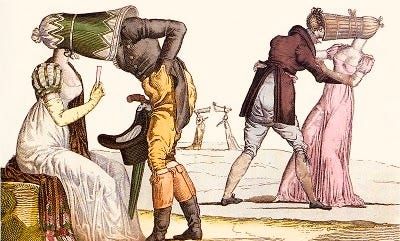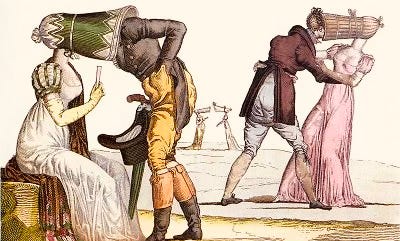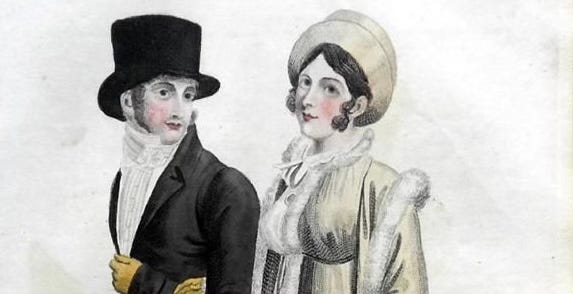‘I do not write for such dull elves
As have not a great deal of ingenuity themselves.’
29th January 1813, a letter from Jane Austen to her sister Cassandra
For those who have never read a Jane Austen novel, but are toying with the possibility, that’s quite a word of warning. But what does she mean?
Obviously, all her novels are romantic comedies about young ladies hoping to find a bloke in their bonnet. But Jane is hoping for more. She wants smart readers who enjoy social comedy yet have the wit to percieve what lies beneath. So don’t be a dull elf!
Jane Austen’s six novels are masterclasses in motivation and psychology, giving deep insights into the dynamics of social interaction and are rich in emotional intelligence. If what makes people tick are your thing, warts and all, look no further. Austen remorselessly skewers the human condition as her characters pursue money, love and power.
Pride & Prejudice - The gateway to Jane Austen’s kingdom
Most people would suggest reading Pride & Prejudice first, and I think I would have to agree. Though this was not the first Austen novel I read, it’s the most accessible for modern readers with a sparky, rebellious, but not self-destructive heroine in Elizabeth Bennett. Elizabeth has a close relationship with her sister, Jane, giving a pleasing two-against-the-world narrative. This novel also has several of Austen’s best comic characters in Mr Collins and Mrs Bennett, as well as one of the best baddies, the aristocratic Lady Catherine de Burgh. And then there’s Mr Darcy, world famous grump and heroic love interest.
Sense & Sensibility - Something different but similar
Another two sisters find love, marriage and financial security against all odds. This always feels like a more serious novel to me with darker undercurrents than Pride & Prejudice. The money element, present in all Austen’s novels is top of the agenda as the Dashwood sisters are thrown into genteel poverty after living as landed gentry. It’s quite a come-down and Marianne Dashwood for one does not want to remain poor for too long. Danger comes very close to marking one of the two main characters irrevocably. Nevertheless, it still sparkles with wit and comic characters, Mrs Jennings and Mr Palmer, and another great baddie, Mrs John Dashwood.
Mansfield Park - Are you ready for her most experimental novel?
This was my first Jane Austen reading experience with apparently everyone’s least favourite heroine, Fanny Price. But to me, Fanny is special. She’s the poor relation to end them all, living under the onerous lid of her wealthy extended family, she’s obliged to play by the rules while they appear to have licence to do what they like. This novel contains probably the worst, most awful and annoying baddie, Mrs Norris, who is actively unpleasant on a regular and very petty basis towards Fanny. There’s hopeless unrequited love, questionable moral judgements, sexual predators and manipulative flatterers. And despite perfect behaviour and good judgement, Fanny suffers and is punished until eventually she’s redeemed. Fanny is judged to be too passive to be a heroine but modern readers overlook and misunderstand her courage in the face of overwhelming forces.
Emma - The most joyous
Another heroine many readers claim not to like but she’s very much in the sparkling mode of Elizabeth Bennett even if her matchmaking skills are woeful and she seems to have no emotional intelligence at all. But that’s the fun of Emma, watching someone mess around with the lives of others whilst not understanding her own feelings. Emma is the girl with all the gifts and this is her journey to self-knowledge. At the end of it there’s Mr Knightly who is number two in my top three heroes from Austen’s six novels.
Northanger Abbey - The coming of age novel
I’m not ashamed to say this is my least favourite, and not Jane’s best. But Jane’s worst is everyone else’s brilliant so this is not a disappointment. It spoofs everything from the marriage market in Bath to fickle friendships and gold-diggers to the fashion for Gothic novels. And yet the characterisation here is good of both Catherine Morland and Henry Tilney. It has two great baddies in the shape of Isabella Thorpe – shallow, opportunistic – as well as General Tilney, over-bearing, angry and the most materialistic of all.
Persuasion - The best comes last
This novel vies for the top spot of my favourite Jane Austen novel along with Mansfield Park - maybe it’s a joint first place. This is all about second chances, lost love, the pain of seeing the one you love with someone else and the heartbreaking conviction that this person not only doesn’t love you but actually dislikes you. This is Austen’s most mature and emotionally intelligent novel, as well as her most heart-wrenching probably because it was based on her own experiences. Nothing quite compares to the first time you read it. That first reading experience made it, for me, unputdownable. And of all Austen’s novels this is the one I’ve re-read the most frequently.
© Annette Gordon 2025





